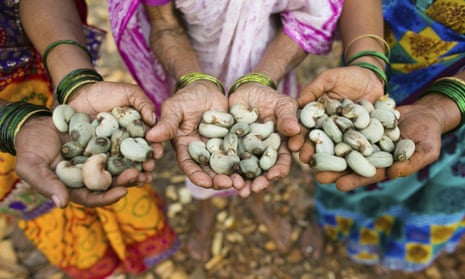Cashew nuts are an important crop for India and many of them are grown by smallholder farmers, who often live below the poverty line. And yet for every tonne of cashew nuts harvested, farmers throw away five tonnes of its highly nutritious fruit, the cashew apple, as there is no established market for this produce.
That is about to change. One of the world’s largest food companies has teamed up with a global NGO to see if the cashew apple can be turned into a valuable crop.
PepsiCo is working with the Clinton Foundation and Acceso Cashew Enterprise to create a supply chain for the cashew apple. One of the problems with using the fruit is that it quickly ferments after picking.
But Acceso, an Indian social enterprise, has taken on the role of purchasing and distributing not just the cashew nut but also its fruit so it can be made into juice. This distribution role is particularly important given that the farms are highly dispersed and often remote.
PepsiCo already uses cashew nuts in its Quaker products, but is now also planning to also the apple from the tree in a mixed fruit drink sold in India under its Tropicana drinks label. A pilot to harvest the fruit was established in 2014 involving 2,000 Indian farmers and the plan is to increase this to 15,000 farms over the next five years.
Farmers who participated in the pilot program said that in just one season sales of the cashew fruit had raised their household income by as much as 20%. The Acceso Cashew Enterprise estimates that once the programme is in full production, smallholders will receive incomes from it that are twice as high.
In order to help farmers increase their productivity, Acceso has leased a number of orchards and converted them into demonstration plots, with a view to “show and tell” farmers the benefits of adopting new farming practices.
